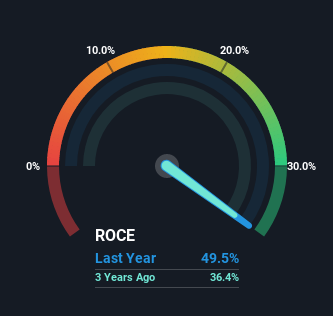We Think Fine Organic Industries (NSE:FINEORG) Might Have The DNA Of A Multi-Bagger
What are the early trends we should look for to identify a stock that could multiply in value over the long term? In a perfect world, we'd like to see a company investing more capital into its business and ideally the returns earned from that capital are also increasing. Put simply, these types of businesses are compounding machines, meaning they are continually reinvesting their earnings at ever-higher rates of return. Speaking of which, we noticed some great changes in Fine Organic Industries' (NSE:FINEORG) returns on capital, so let's have a look.
Return On Capital Employed (ROCE): What Is It?
For those that aren't sure what ROCE is, it measures the amount of pre-tax profits a company can generate from the capital employed in its business. To calculate this metric for Fine Organic Industries, this is the formula:
Return on Capital Employed = Earnings Before Interest and Tax (EBIT) ÷ (Total Assets - Current Liabilities)
0.49 = ₹4.9b ÷ (₹12b - ₹2.5b) (Based on the trailing twelve months to June 2022).
So, Fine Organic Industries has an ROCE of 49%. That's a fantastic return and not only that, it outpaces the average of 17% earned by companies in a similar industry.
Check out our latest analysis for Fine Organic Industries

Above you can see how the current ROCE for Fine Organic Industries compares to its prior returns on capital, but there's only so much you can tell from the past. If you'd like to see what analysts are forecasting going forward, you should check out our free report for Fine Organic Industries.
What Does the ROCE Trend For Fine Organic Industries Tell Us?
Investors would be pleased with what's happening at Fine Organic Industries. Over the last five years, returns on capital employed have risen substantially to 49%. The company is effectively making more money per dollar of capital used, and it's worth noting that the amount of capital has increased too, by 200%. The increasing returns on a growing amount of capital is common amongst multi-baggers and that's why we're impressed.
What We Can Learn From Fine Organic Industries' ROCE
In summary, it's great to see that Fine Organic Industries can compound returns by consistently reinvesting capital at increasing rates of return, because these are some of the key ingredients of those highly sought after multi-baggers. And with the stock having performed exceptionally well over the last three years, these patterns are being accounted for by investors. Therefore, we think it would be worth your time to check if these trends are going to continue.
On the other side of ROCE, we have to consider valuation. That's why we have a FREE intrinsic value estimation on our platform that is definitely worth checking out.
If you'd like to see other companies earning high returns, check out our free list of companies earning high returns with solid balance sheets here.
New: AI Stock Screener & Alerts
Our new AI Stock Screener scans the market every day to uncover opportunities.
• Dividend Powerhouses (3%+ Yield)
• Undervalued Small Caps with Insider Buying
• High growth Tech and AI Companies
Or build your own from over 50 metrics.
Have feedback on this article? Concerned about the content? Get in touch with us directly. Alternatively, email editorial-team (at) simplywallst.com.
This article by Simply Wall St is general in nature. We provide commentary based on historical data and analyst forecasts only using an unbiased methodology and our articles are not intended to be financial advice. It does not constitute a recommendation to buy or sell any stock, and does not take account of your objectives, or your financial situation. We aim to bring you long-term focused analysis driven by fundamental data. Note that our analysis may not factor in the latest price-sensitive company announcements or qualitative material. Simply Wall St has no position in any stocks mentioned.
About NSEI:FINEORG
Fine Organic Industries
Engages in manufacture, processing, supply, distribution, dealing, import, and export of oleochemical-based additives in India and internationally.
Flawless balance sheet with limited growth.
Market Insights
Community Narratives




